8:46 Book Club
Monthly Book Club for 2025
4th Thursdays • 7:30-9:30pm EST
by john a. powell and Stephen Menendian
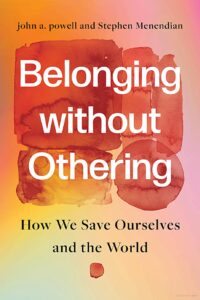 The root of all inequality is the process of othering – and its solution is the practice of belonging We all yearn for connection and community, but we live in a time when calls for further division along the well-wrought lines of religion, race, ethnicity, caste, and sexuality are pervasive. This ubiquitous yet elusive problem feeds on fears – created, inherited – of the “other.”
The root of all inequality is the process of othering – and its solution is the practice of belonging We all yearn for connection and community, but we live in a time when calls for further division along the well-wrought lines of religion, race, ethnicity, caste, and sexuality are pervasive. This ubiquitous yet elusive problem feeds on fears – created, inherited – of the “other.”
While the much-touted diversity, equity, and inclusion initiatives are undeniably failing, and activists narrowly focus on specific and sometimes conflicting communities, Belonging without Othering prescribes a new approach that encourages us to turn toward one another in unprecedented and radical ways. The pressures that separate us have a common root: our tendency to cast people and groups in irreconcilable terms – or the process of “othering.”
This book gives vital language to this universal problem, unveiling its machinery at work across time and around the world. To subvert it, john a. powell and Stephen Menendian make a powerful and sweeping case for adopting a paradigm of belonging that does not require the creation of an “other.” This new paradigm hinges on transitioning from narrow to expansive identities – even if that means challenging seemingly benevolent forms of community-building based on othering. As the threat of authoritarianism grows across the globe, this book makes the case that belonging without othering is the necessary, but not the inevitable, next step in our long journey toward creating truly equitable and thriving societies.
The authors argue that we must build institutions, cultivate practices, and orient ourselves toward a shared future, not only to heal ourselves, but perhaps to save our planet as well. Brimming with clear guidance, sparkling insights, and specific examples and practices, Belonging without Othering is a future-oriented exploration that ushers us in a more hopeful direction.
by Ijeoma Oluo
From the #1 New York Times–bestselling author of So You Want to Talk About Race and Mediocre, an eye-opening and galvanizing look at the current state of anti-racist activism across America.
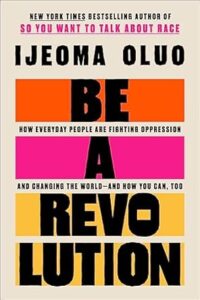 In the #1 New York Times bestseller So You Want To Talk About Race, Ijeoma Oluo offered a vital guide for how to talk about important issues of race and racism in society. In Mediocre: The Dangerous Legacy of White Male America, she discussed the ways in which white male supremacy has had an impact on our systems, our culture, and our lives throughout American history. But now that we better understand these systems of oppression, the question is this: What can we do about them?
In the #1 New York Times bestseller So You Want To Talk About Race, Ijeoma Oluo offered a vital guide for how to talk about important issues of race and racism in society. In Mediocre: The Dangerous Legacy of White Male America, she discussed the ways in which white male supremacy has had an impact on our systems, our culture, and our lives throughout American history. But now that we better understand these systems of oppression, the question is this: What can we do about them?
With Be A Revolution: How Everyday People are Fighting Oppression and Changing the World—and How You Can, Too, Oluo aims to show how people across America are working to create real positive change in our structures. Looking at many of our most powerful systems—like education, media, labor, health, housing, policing, and more—she highlights what people are doing to create change for intersectional racial equity. She also illustrates various ways in which the reader can find entryways into change in these same areas, or can bring some of this important work being done elsewhere to where they live.
This book aims to not only be educational, but to inspire action and change. Oluo wishes to take our conversations on race and racism out of a place of pure pain and trauma, and into a place of loving action. Be A Revolution is both an urgent chronicle of this important moment in history, as well as an inspiring and restorative call for action.
by adrienne marie brown
New York Times-bestselling author adrienne maree brown knows we need each other more than ever, and offers “loving corrections”: a roadmap towards collective power, righting wrongs, and true belonging.
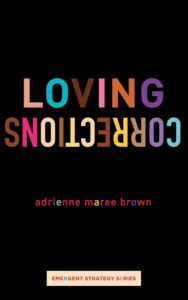 This selection of prescient, compassionate essays explores patterns we engage in that are rooted in limited thinking. Through a lens of “loving correction” rather than mere critique, author adrienne maree brown helps us reimagine how to hold ourselves, our loved ones, and our communities accountable by setting clear boundaries, engaging in reflection, and nurturing honest relationships.
This selection of prescient, compassionate essays explores patterns we engage in that are rooted in limited thinking. Through a lens of “loving correction” rather than mere critique, author adrienne maree brown helps us reimagine how to hold ourselves, our loved ones, and our communities accountable by setting clear boundaries, engaging in reflection, and nurturing honest relationships.
Loving Corrections is divided into two sections, with the first portion featuring new essays including “A Word for White People” and “Relinquishing the Patriarchy” and writing on topics like moving from fragility to fortitude, disability, and navigating critique within activist communities. The second section expands and updates pieces from brown’s popular monthly column “Murmurations” in YES! Magazine that explore accountability—within oneself and community—with depth, inventiveness, and empathy.
Along with allowing us more authentic access to ourselves and to each other, the “corrections” in the book’s title are intended to explore and break identity-based patterns including white supremacy, fragility, patriarchy, and ableism. brown also offers practical guidance on how to apologize and be accountable from our nuanced positions of power, history, and resources.
Building on her previous work—especially Holding Change and We Will Not Cancel Us—brown reminds us how much we need each other: “It is only through relationship that we learn how to be, understand our impact on others and explore small shifts that may yield remarkable collective change.”
by Roxane Gay, Megan Pillow
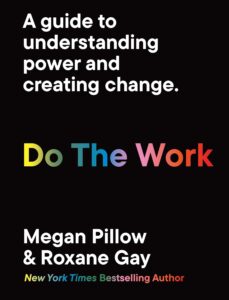 Power is complex. But Do The Work is a guide to navigating those complexities. From ancient theories of power to contemporary examples, from cultural patterns to personal insights, this guide provides a foundation for examining hierarchies and inequalities and establishes a framework for understanding power and how it shapes our lives and communities.
Power is complex. But Do The Work is a guide to navigating those complexities. From ancient theories of power to contemporary examples, from cultural patterns to personal insights, this guide provides a foundation for examining hierarchies and inequalities and establishes a framework for understanding power and how it shapes our lives and communities.
Between these pages, theory, commentary, and analysis create an engaging, creative, and mindful reading experience. This guide features approachable overviews of complex topics, thought-provoking questions, evocative illustrations, pages for your reflections, and steps we can all take to reframe our relationship to power and reinvigorate our desire to empower the people around us.
Thanks to the work of writer and scholar Megan Pillow, educator and New York Times bestselling author Roxane Gay, and New York Times bestselling illustrator Aurélia Durand, Do The Work is a must-read for a more just future—and a more equitable now.
Do The Work asks:
- What can we learn about power from history and from our current moment?
- Who are the powerful, and who are the people denied power?
- Where are our own sources of power?
- How do we recognize our mistakes and become more self-aware?
- What does it mean to reclaim our power and to build community?
Do The Work explains:
- How theorists from Aristotle to Hannah Arendt have shaped our understanding of power
- Why Kimberlé Crenshaw’s theory of intersectionality is at the heart of power discussions
- What Laura Mulvey and Audre Lorde can teach us about power and gender
- How poverty, redlining, and The Voting Rights Act all illustrate power imbalances
- What the Stonewall Riots showed us about resistance and community
- How to train ourselves in collective thinking, and what it means to “choose the margins”
The Souls of Queer Folk: How Understanding LGBTQ+ Culture Can Transform Your Leadership Practice by Joel A. Brown
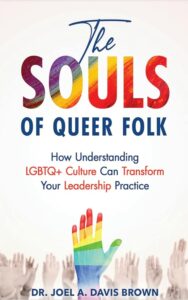 You’d be hard-pressed to find a leader who doesn’t want to be better.
You’d be hard-pressed to find a leader who doesn’t want to be better.
Yet, at a time when leaders are being asked to do more with fewer resources, modern professionals are having a difficult time leading in a distinctive, powerful, and transformative way. At a time when leaders are feeling besieged, the question is: to whom should they turn to learn, develop, and embody a new form of inspired leadership? For some, the answer may be surprising.
As we start to appreciate the diversity in our world and the talent that comes from underserved markets and underrepresented communities, our society has a great opportunity to refashion our workplaces, rethink how we lead our social organizations and educational institutions, and rebuild our communities. In this groundbreaking book, Dr. Davis Brown demonstrates how the values and norms of the LGBTQ+ community are instructive for leaders in all types of business and industry, and can serve as the foundation for a bold, new brand of transformative leadership.
Using quantitative and qualitative research methods, Dr. Davis Brown conducted a study to illuminate the lived experiences and cultural values of the LGBTQ+ community. Based on that research, he developed 9 leadership dimensions that show how understanding the cultural imprint of the LGBTQ+ community is essential for organizations to be employers of choice and for global communities to maintain their vitality.
Today’s generation of leaders need time-tested, practical, and dynamic “sage advice” to deal with the perils of an increasingly complex world. The Queer wisdom that Dr. Davis Brown highlights will help any leader promote sustainable growth, foster equity and connection, and demonstrate human-centered leadership as the global landscape continues to change and evolve in the 21st century.
The LGBTQ+ community is multifaceted, talented, and gifted in so many ways. Yet there are forces in society that continue to silence and discriminate against LGBTQ+ people. Given the challenges we face in this day and age with climate change, poverty, war, extremism, displacement, and repression, strong leadership and wisdom are critical. It’s time to broaden our perspective and open our eyes to a way of being that encourages everyone to reach their potential and be proud of who they are.
by Amia Srinivasan
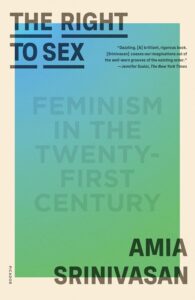 How should we think about sex? It is a thing we have and also a thing we do; a supposedly private act laden with public meaning; a personal preference shaped by outside forces; a place where pleasure and ethics can pull wildly apart.
How should we think about sex? It is a thing we have and also a thing we do; a supposedly private act laden with public meaning; a personal preference shaped by outside forces; a place where pleasure and ethics can pull wildly apart.
How should we talk about sex? Since #MeToo many have fixed on consent as the key framework for achieving sexual justice. Yet consent is a blunt tool. To grasp sex in all its complexity—its deep ambivalences, its relationship to gender, class, race and power—we need to move beyond yes and no, wanted and unwanted.
We do not know the future of sex—but perhaps we could imagine it. Amia Srinivasan’s stunning debut helps us do just that. She traces the meaning of sex in our world, animated by the hope of a different world. She reaches back into an older feminist tradition that was unafraid to think of sex as a political phenomenon. She discusses a range of fraught relationships—between discrimination and preference, pornography and freedom, rape and racial injustice, punishment and accountability, students and teachers, pleasure and power, capitalism and liberation.
The Right to Sex: Feminism in the Twenty-First Century is a provocation and a promise, transforming many of our most urgent political debates and asking what it might mean to be free.
by Prentis Hemphill
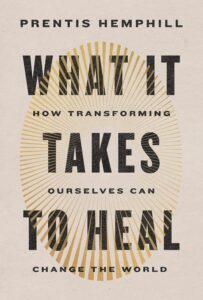 As we emerge from the past few years of collective upheaval, are we ready to face the complexities of our time with joy, authenticity, and connection? Now more than ever, we must learn to heal ourselves, connect with one another, and embody our values. In this revolutionary book, Prentis Hemphill shows us how.
As we emerge from the past few years of collective upheaval, are we ready to face the complexities of our time with joy, authenticity, and connection? Now more than ever, we must learn to heal ourselves, connect with one another, and embody our values. In this revolutionary book, Prentis Hemphill shows us how.
What It Takes to Heal asserts that the principles of embodiment—the recognition of our body’s sensations and habits, and the beliefs that inform them—are critical to lasting healing and change. Hemphill, an expert embodiment practitioner, therapist, and activist who has partnered with Brené Brown, Tarana Burke, and Esther Perel, among others, shows us that we don’t have to carry our emotional burdens alone.
Hemphill demonstrates a future in which healing is done in community, weaving together stories from their own experience as a trauma survivor with clinical accounts and lessons learned from their time as a social movement architect. They ask, “What would it do to movements, to our society and culture, to have the principles of healing at the very center? And what does it do to have healing at the center of every structure and everything we create?”
In this life-affirming framework for the way forward, Hemphill shows us how to heal our bodies, minds, and souls—to develop the interpersonal skills necessary to break down the doors of disconnection and take the necessary risks to reshape our world toward justice.
by Sonya Renee Taylor
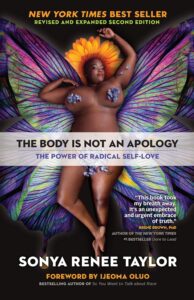 Humans are a varied and divergent bunch with all manner of beliefs, morals, and bodies. Systems of oppression thrive off our inability to make peace with difference and injure the relationship we have with our own bodies.
Humans are a varied and divergent bunch with all manner of beliefs, morals, and bodies. Systems of oppression thrive off our inability to make peace with difference and injure the relationship we have with our own bodies.
The Body Is Not an Apology offers radical self-love as the balm to heal the wounds inflicted by these violent systems. World-renowned activist and poet Sonya Renee Taylor invites us to reconnect with the radical origins of our minds and bodies and celebrate our collective, enduring strength.
As we awaken to our own indoctrinated body shame, we feel inspired to awaken others and to interrupt the systems that perpetuate body shame and oppression against all bodies. When we act from this truth on a global scale, we usher in the transformative opportunity of radical self-love, which is the opportunity for a more just, equitable, and compassionate world—for us all.
This second edition includes stories from Taylor’s travels around the world combating body terrorism and shines a light on the path toward liberation guided by love. In a brand new final chapter, she offers specific tools, actions, and resources for confronting racism, sexism, ableism, homophobia, and transphobia. And she provides a case study showing how radical self-love not only dismantles shame and self-loathing in us but has the power to dismantle entire systems of injustice. Together with the accompanying workbook, Your Body Is Not an Apology, Taylor brings the practice of radical self-love to life.
by Atossa Araxia Abrahamian
 Borders draw one map of the world; money draws another. A journalist’s riveting account exposes a parallel universe that has become a haven for the rich and powerful.
Borders draw one map of the world; money draws another. A journalist’s riveting account exposes a parallel universe that has become a haven for the rich and powerful.
A globe shows the world we think we know: neatly delineated sovereign nations that grant or restrict their citizens’ rights. Beneath, above, and tucked inside their borders, however, another universe has been engineered into existence. It consists of thousands of extraterritorial zones that operate largely autonomously, and increasingly for the benefit of the wealthiest individuals and corporations.
Atossa Abrahamian traces the rise of this hidden globe to thirteenth-century Switzerland, where poor cantons marketed their only commodity: bodies, in the form of mercenary fighters. Over time, economists, theorists, statesmen, and consultants evolved ever more sophisticated ways of exporting and exploiting statelessness, in the form of free trade zones, flags of convenience, offshore detention centers, charter cities controlled by foreign corporations, and even into outer space. By mapping this countergeography, which decides who wins and who loses in the new global order—and helping us to see how it might be otherwise—The Hidden Globe fascinates, enrages, and inspires.
by Rachel Cargle
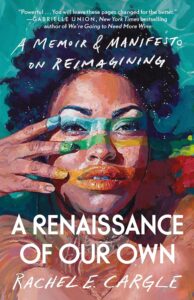 There are breaking points in all our lives when we realize that the way things have been done before just don’t work for us anymore, be it the way we approach our relationships, our belief systems, our work, our education, even our rest. For activist, philanthropist, and CEO Rachel E. Cargle, reimagining—the act of creating in our minds that which does not exist but that we believe can and should—has been a lifelong process. Reimagining served as the most powerful catalyst for Cargle’s personal transformation from a small-town Christian wife to an incisive queer feminist voice of a generation
There are breaking points in all our lives when we realize that the way things have been done before just don’t work for us anymore, be it the way we approach our relationships, our belief systems, our work, our education, even our rest. For activist, philanthropist, and CEO Rachel E. Cargle, reimagining—the act of creating in our minds that which does not exist but that we believe can and should—has been a lifelong process. Reimagining served as the most powerful catalyst for Cargle’s personal transformation from a small-town Christian wife to an incisive queer feminist voice of a generation
In A Renaissance of Our Own, we witness the sometimes painful but always inspiring breaking points in Cargle’s life that fostered a truer identity. These defining moments offer a blueprint for how we must all use our imagination—the space that sees beyond limits—to live in alignment with our highest values and to craft a world independent of oppressive structures, both personal and societal.
Cargle now invites you to acknowledge ways of being that stem from societal expectations instead of your personal truth, and to embark on a renaissance of your own. She provides the very tools and prompts that she used to unearth her own truth, tools that opened her up to being a more authentic feminist and purpose-driven matriarchal leader.
A Renaissance of Our Own gives us the courage to look at the world and say “I want something different.” It serves as a reminder of the power and possibility of reimagining a life that feels right, all the way down to the marrow of your bones.
When we talk about getting our Holy on, we mean individually and collectively. We are therefore committed to addressing the one thing that affects all of us, that has been responsible for much of the pain and inequality and injustice in our country…
…systemic racism.
In 2020, the world erupted in one voice against police brutality fueled by racism after the murder of George Floyd, a black man, by a white police officer, who knelt on his neck for 8 min and 46 sec. His death was not the first like it, or sadly the last, but perhaps because the world was able to witness the entire cruelty of it, a nerve was struck like never before and an awakening was triggered.
Since then we’ve led book studies with the intention of educating ourselves about systemic racism and what’s our to do individually, and collectively, to dismantle this scourge, and to create a world that works for all. In honor of George Floyd, all the needless deaths before and since his, and in recognition of the work that’s collectively ours to do, we are calling our ongoing book studies the 8:46 Book Club.
While we later learned through the course of Derek Chauvin’s murder trial that the length of time he brutally knelt on George Floyd’s neck was much longer, 9 minutes and 30 seconds, we chose to stay with 8:46 – a number that had already been carved into the minds of millions – a number that reminds us of our individual and collective work of deconstructing racism and building an antiracist culture.
The only cost for anyone to participate will be a donation of your choosing. A portion of the proceeds we collect are donated to organizations committed to antiracist work.
Connect with us today!
Join with us as we create a world of love, justice, and liberation by healing our misguided ideas of who we are, as well as what we think the world is, so that together we live our Holiest selves.
To change our world we must live and work where courage, inclusion, belonging and purpose intersect.
project_SANCTUS is that place.
For more information feel free to CONTACT US.

